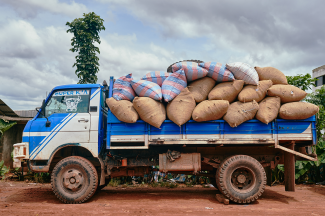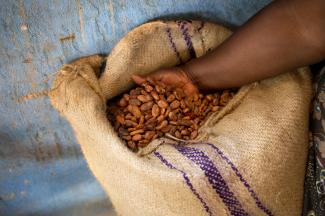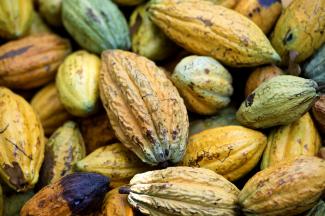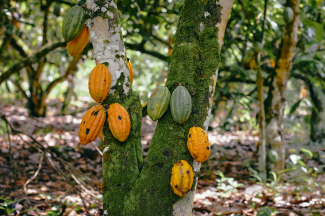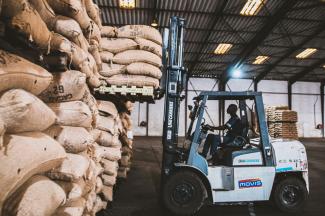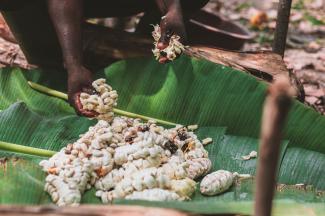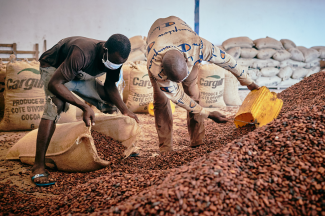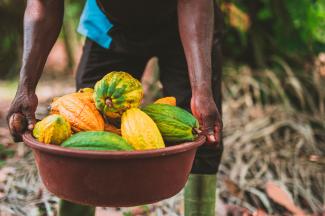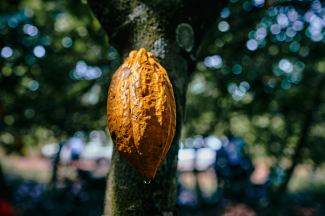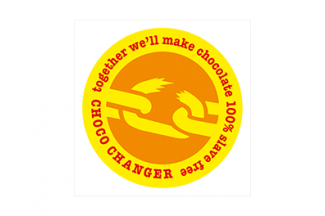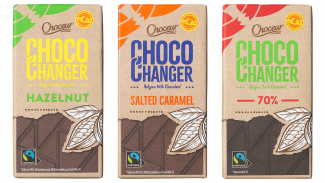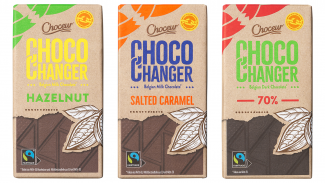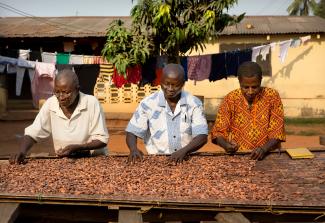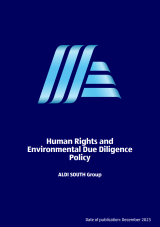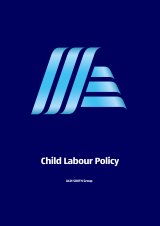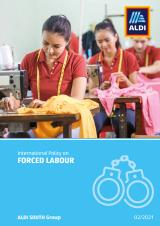CHOCO CHANGER
HOLDING CHANGE IN YOUR HANDS
Our sustainably sourced chocolate
A sweet taste, a delicious smell and a little bit(e) of happiness: We are excited to present our responsibly sourced chocolate: Choceur Choco Changer. As the first discount retailer, ALDI has joined Tony’s Open Chain. Our customers’ choice is empowering cocoa farmers in West Africa. Together, we can amplify our positive impact and change the norm in the cocoa industry by working on ending poverty, illegal child labour, and deforestation.

The Choceur Choco Changer is on sale in different variants in Germany, UK, Austria, Switzerland, Hungary, Slovenia, and Italy. You might have also noticed that the Choceur CHOCO CHANGER bars look different from other chocolate. The shape of the triangular pieces replicates the cocoa plantations from above and the different heights of the pieces demonstrate the reality that in the cocoa value chain risks and rewards are not equally distributed. The Choceur CHOCO CHANGER is not only a delicious treat, but also a piece of art.
The chocolate’s ingredients are Fairtrade certified and sourced from Fairtrade producers. Selling more of their cocoa, sugar and vanilla on Fairtrade terms enables farmers to get fairer trading conditions, stimulate social change and engage in environmental protection. By going beyond certification with Tony’s Open Chain, we collaborate to become sustainability frontrunners with the CHOCO CHANGER.
The Open Chain
5 Sourcing Principles
Tony’s Open Chain is an initiative by Tony’s Chocolonely, where they invite other chocolate brands to join Tony’s Open Chain and work together to change the norm in chocolate. ALDI is the first international discount retailer to join Tony’s Open Chain.

“We are convinced that being a mission ally of Tony’s Open Chain enables us to offer our customers a fair and 100% responsible piece of chocolate. With this chocolate, we create positive change and offer a best practice product while doing our part to respect human rights and nature in the cocoa supply chain.“
Anke Ehlers, Managing Director of Corporate Responsibility International at the ALDI SOUTH Group
The cocoa beans for the Choceur CHOCO CHANGER are responsibly sourced via Tony's Open Chain. By adopting their 5 Sourcing Principles, we have joined the mission to make chocolate 100% slave free. Tony’s Open Chain helps chocolate brands transform their cocoa supply chains and become sustainability frontrunners.
By opening the chain, ALDI takes responsibility for:
- An open and transparent chain, where issues are always in the open so they can be solved
- Direct and equal business relations throughout the entire chain
- Paying a higher price which makes a living income achievable for farmers
- Ending modern slavery and illegal child labour in cocoa by setting a new industry standard
Traceable beans
We source directly from the farmer cooperatives; this means we know where our beans are grown. All plantations we source from are GPS mapped, which increases our insights on traceability of the first mile, from farm gate to cooperative. With Tony’s BeanTracker we always know where cocoa beans are at any point in our supply chain. Not only do we track physical beans and know which farmers produce the beans, but also under which social circumstances.
A higher price
We pay a price on top of the Fairtrade premium to enable farmers to earn a living income and invest in their farms. A living income covers a decent standard of living for the cocoa farmer’s family, including housing, food and education as well as the costs of production, including fertilizer, seeds, and equipment.
A Farmgate price is the minimum set price a farmer receives for a kilogramme of cocoa beans. On top of the Farmgate price, ALDI pays an additional Fairtrade premium through Fairtrade and an additional LIRP (Living income reference price) premium through Tony’s Open Chain. This enables the farmers to earn a living income.
Strong farmers
We support professional cooperatives of farmers. Together they are stronger and can work together more professionally as an organization, achieve economies of scale and create commitment and trust among the farmer members of the cooperatives. The cooperatives organise annual general meetings, where the members meet to democratically decide how to spend premiums and to celebrate the end of the season. Through Tony’s Open Chain we are engaged with 14,763 cocoa farmers.
The long term
We engage in long-term commitments giving the farmers income security and the opportunity to invest in their businesses, enabling them to make better, long-term decisions. ALDI acts as a responsible business partner as normally cocoa farmers sell their beans per season without guarantee for farmers to sell all their crop.
Productivity and quality
We help farmers to improve yields through training and investments by Tony’s Open Chain and to get access to markets. To assist farmers in the application of Good Agricultural Practices the Farmer Coaching Initiative has been set up that is co-funded by ALDI and other mission allies.
Cocoa Production
In two West African countries - Ghana and Côte d’Ivoire - about 2.5 million cocoa farming families produce more than 60% of the world’s cocoa. The cocoa used in ALDI products comes mainly from these two countries. Cocoa is grown by smallholder farmers who may face difficult working and living conditions. Human rights violations including illegal child labour, as well as environmental risks such as deforestation, are key challenges when sourcing cocoa.
The ALDI SOUTH Group is committed to fostering fair working conditions and environmentally friendly production in the cultivation of cocoa. By adopting Tony’s Open Chain’s 5 Sourcing Principles for the Choceur CHOCO CHANGER we are creating positive change in this sector by supporting those that need it the most: the cocoa farmers in West Africa.
We commit to regularly report on our engagement, recognising challenges and lessons learnt.
Cocoa value chain
The cocoa beans for Choceur CHOCO CHANGER are grown by smallholder farmers in Ghana and Côte d’Ivoire. After the harvest, the beans are dried, fermented and packed for transportation. The exporter ships the beans from West Africa to Antwerp where the beans are processed into cocoa liquor. Some of the beans remain in Côte d’Ivoire where they are pressed into butter at SACO before being transported to Europe. The liquor and butter are processed into liquid chocolate (couverture), and then manufactured into their final shape by our direct business partners to make the fabulous Choceur CHOCO CHANGER.
Tony's BeanTracker
We believe that once you know where your beans come from and under what circumstances they are harvested, we can better tackle the issues at hand. Tony’s BeanTracker digitally logs where the beans are at any moment in time in the supply chain. We can see which cooperative and farmer has supplied which amount of cocoa. We can ensure that the farmers receive the Living Income premium. We know which farmers supplied what percentages of each shipping container of beans and we know what volume of beans is being shipped and what is being processed in Belgium.
The cocoa beans flowing through Tony’s Open Chain are 100% traceable. All chocolate components for the Choceur CHOCO CHANGER are also fully segregated in production from any other certified or conventional cocoa to ensure that the beans can be traced back to the cooperatives we work with.
These cocoa farmers are affiliated with our partner cooperatives and supply to Tony’s Open Chain:
Farmer support
The farmer coaching initiative focuses on creating individual farm plans, which give a tailored solution on how to improve the overall yield of a specific farm. This can mean the planting of new and younger cocoa trees or a more spaced-out planting structure to give each cocoa tree enough room and light to grow. The correct way of pruning can also massively increase the number of cocoa pods growing from a single tree. Shade tree nurseries are set up which will give shade to the cocoa trees, help farmers move towards a more environmentally friendly agroforestry-based farming approach, and provide the farmers with additional crops and income.
Human rights
As an international company with global supply chains, we are aware of our responsibility to respect human rights. The ALDI SOUTH Group is certain that long-term business success can only be ensured if human rights are acknowledged and respected, protected and fulfilled. Human rights violations are a global problem affecting every economy, industry and sector. We have an important role to play in raising awareness of human rights and working collaboratively with our business partners and other external parties to prevent or mitigate the adverse impact of our business or remediate where necessary.
Modern slavery
Forced labour continues to be a severe problem in the cocoa industry. A study conducted in 2018 confirms that at least 30,000 people are victims of modern slavery in the cocoa industry in Ghana and Ivory Coast.
The ALDI SOUTH Group and the ALDI Nord Group jointly published their ‘International Policy on Forced Labour’ in order to expand their zero-tolerance approach to any forms of slavery and forced labour. This Policy expands on ALDI’s existing commitments to human rights and underlines ALDI’s stance that any forms of servitude or modern slavery, or forced, bonded, indentured, trafficked, or non-voluntary labour are unacceptable throughout ALDI’s supply chains. This concerns all relevant stakeholders including all suppliers, production facilities, service providers, and contractors.
Child labour
Illegal child labour remains a prevalent problem in the cocoa supply chain due to severe poverty, as well as unawareness. The National Opinion Research Center at the University of Chicago (NORC 2020) estimates that 1.56 million children are working in cocoa production in Côte d’Ivoire and Ghana. 95% of the children working on cocoa plantations are doing hazardous work, such as working with dangerous tools or harmful pesticides.
ALDI does not tolerate illegal child labour in any areas of its operations, including its supply chains. Additionally, ALDI does not tolerate children being exposed to any other risk in production sites used for our products. The cocoa used in almost all of ALDI’s cocoa-containing products is certified according to UTZ/Rainforest Alliance and Fairtrade. All of these standards set requirements for the prevention of child labour in supply chains.
To fight illegal child labour, Tony’s started to implement a system developed by the International Cocoa Initiative (ICI) and Nestlé. The so-called CLMRS stands for Child Labour Monitoring and Remediation System. This system helps the cooperatives, which ALDI sources cocoa from for the Choceur CHOCO CHANGER to identify instances of illegal child labour, find alternative solutions, and prevent the use of illegal child labour by raising awareness around the topic. The CLRMS aims to get a child out of child labour within a period of 6 to 12 months after the case is found. With support from ICI and Tony's, the cooperatives roll out the system to all their members, moving beyond the farmers we work with, aiming to reach the entire community.
Living income
Inequality in the cocoa chain and the resulting extreme poverty are the root cause of modern slavery, illegal child labour, and deforestation. Working towards the payment of a living income and wage are an important part of a sustainable supply chain. ALDI pays farmers a premium based on the calculations of a living income by Fairtrade and Tony’s Chocolonely. The higher price takes into consideration the costs of living and the costs of farming.
Fairtrade and Tony’s Chocolonely share their vision on enabling a living income and use the same model for calculating the cocoa price that enables farmer to earn a living income. They have improved existing models, integrated widely accepted benchmarks and research and share their insights with the chocolate industry with the Living Income Reference Price for cocoa.
